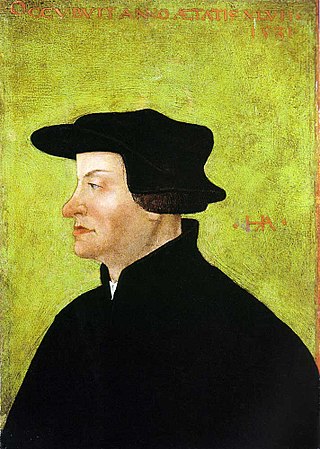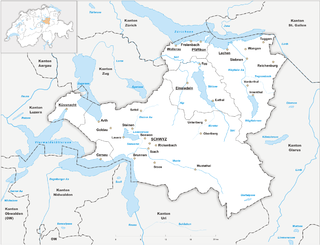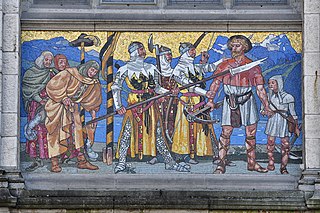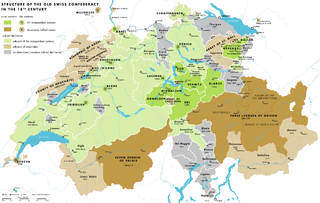Related Research Articles

Huldrych or Ulrich Zwingli was a Swiss Christian theologian, musician, and leader of the Reformation in Switzerland. Born during a time of emerging Swiss patriotism and increasing criticism of the Swiss mercenary system, he attended the University of Vienna and the University of Basel, a scholarly center of Renaissance humanism. He continued his studies while he served as a pastor in Glarus and later in Einsiedeln, where he was influenced by the writings of Erasmus.

Since 1848, the Swiss Confederation has been a federal republic of relatively autonomous cantons, some of which have a history of federation that goes back more than 700 years, putting them among the world's oldest surviving republics.

The canton of Schwyz is a canton in central Switzerland between the Alps in the south, Lake Lucerne to the west and Lake Zürich in the north, centred on and named after the town of Schwyz.

The canton of Uri is one of the 26 cantons of Switzerland and a founding member of the Swiss Confederation. It is located in Central Switzerland. The canton's territory covers the valley of the Reuss between the St. Gotthard Pass and Lake Lucerne.

Obwalden or Obwald is one of the 26 cantons forming the Swiss Confederation. It is composed of seven municipalities and the seat of the government and parliament is in Sarnen. It is traditionally considered a "half-canton", the other half being Nidwalden.

Altdorf is a municipality in Switzerland. It is the capital of the Swiss canton of Uri and retains historic town privileges. It is the place where, according to the legend, William Tell shot the apple from his son's head.

William Tell is a folk hero of Switzerland. According to the legend, Tell was an expert mountain climber and marksman with a crossbow who assassinated Albrecht Gessler, a tyrannical reeve of the Austrian dukes of the House of Habsburg positioned in Altdorf, in the canton of Uri. Tell's defiance and tyrannicide encouraged the population to open rebellion and make a pact against the foreign rulers with neighbouring Schwyz and Unterwalden, marking the foundation of the Swiss Confederacy. Tell was considered the father of the Swiss Confederacy.

The Old Swiss Confederacy began as a late medieval alliance between the communities of the valleys in the Central Alps, at the time part of the Holy Roman Empire, to facilitate the management of common interests such as free trade and to ensure the peace along the important trade routes through the mountains. The Hohenstaufen emperors had granted these valleys reichsfrei status in the early 13th century. As reichsfrei regions, the cantons of Uri, Schwyz, and Unterwalden were under the direct authority of the emperor without any intermediate liege lords and thus were largely autonomous.

The early modern history of the Old Swiss Confederacy and its constituent Thirteen Cantons encompasses the time of the Thirty Years' War (1618–1648) until the French invasion of 1798.

Melchior Russ was a Swiss historian.

The Rütli Oath is the legendary oath taken at the foundation of the Old Swiss Confederacy by the representatives of the three founding cantons, Uri, Schwyz and Unterwalden. It is named after the site of the oath taking, the Rütli, a meadow above Lake Uri near Seelisberg. Recorded in Swiss historiography from the 15th century, the oath is notably featured in the 19th century play William Tell by Friedrich Schiller.

The White Book of Sarnen is a collection of medieval manuscripts compiled in the late 15th century by Hans Schriber, state secretary (Landschreiber) in the Swiss Confederation canton Obwalden. This volume, 258 pages in length, was given its name because of the white parchment in which it is bound. The White Book of Sarnen contains the earliest surviving reference to the Swiss national hero William Tell.
The Bundeslied or Tellenlied is a patriotic song of the Old Swiss Confederacy. Its original composition dates to the Burgundian Wars period (1470s). The oldest extant manuscript text was written in 1501, the first publication in print dates to 1545. It consists of stanzas of six lines each, with a rhyming scheme of A-A-B-C-C-B. It is one of the oldest existing records of the legend of Swiss national hero William Tell.
The Chronicle of the City of Lucerne is the oldest existing chronological account of the history of the city of Lucerne.

The Chronicle of the Swiss Confederation is the oldest printed chronicle of Switzerland. The Chronicle of the Swiss Confederation was written by Petermann Etterlin’s from Lucerne. According to the Swiss historian Jean-François Bergier, Etterlin decided to compose a chronicle on the history of the city of Lucerne towards the end of his life, between 1505 and 1507. Etterlin’s chronicle, which was printed for the first time in 1507 by Michael Furter, is considered to be the earliest surviving printed version of the William Tell story.
Conrad Justinger was a 14th-century chronicler who was probably born in Strasbourg.
The Chronicon Helveticum is one of the oldest accounts of the early history of the Swiss Confederation.

The historiography of Switzerland is the study of the history of Switzerland.
The Reformation in Zürich was promoted initially by Huldrych Zwingli, who gained the support of the magistrates of the city of Zürich and the princess abbess Katharina von Zimmern of the Fraumünster Abbey, and the population of the city of Zürich and agriculture-oriented population of the present Canton of Zürich in the early 1520s. It led to significant changes in civil life and state matters in Zürich and spread to several other cantons of the Old Swiss Confederacy, and thus initiated the Reformation in Switzerland.

Uri is a Swiss Talschaft and canton in the upper Reuss valley.
References
- Bergier, Jean-François. Wilhelm Tell: Realität und Mythos. München: Paul List Verlag, 1990.